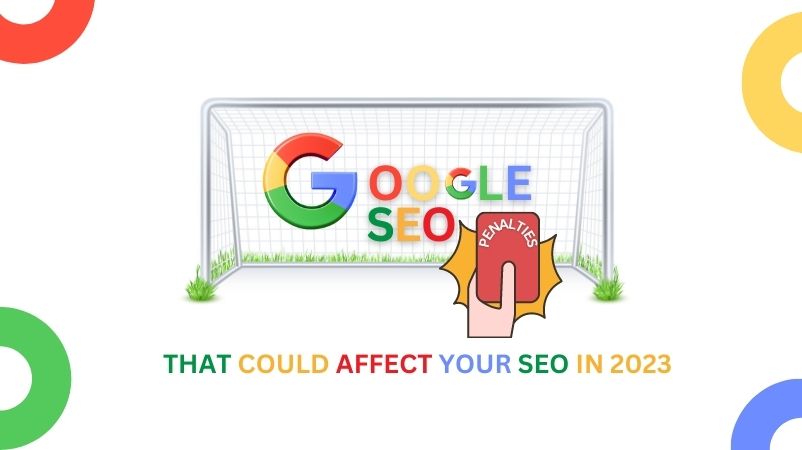
A fine is always a sign that someone has done something wrong. Think about sports.
When a player is penalized, they are usually penalized in some way, affecting their entire team and, more often than not, the game’s outcome.
Google’s penalties are the same. Google will penalize your website if your strategies and tactics go against its goal of getting its users to find the relevant content they want.
If you follow Google’s rules, you will be ranked higher than your competitors.
But if you break their rules, your website can be taken down and made unavailable to users.
If you get fined, it can be hard to get back on track.
Because of these factors, it is critical to understand the most important Google SEO penalties that many websites violate.
In this article, I’ll explain common Google penalties that can affect your SEO.
Top 10 Google SEO Penalties
The following penalties are often imposed against websites. No matter how often, these penalties can still affect how your website ranks in search results.
1) Duplicate Content Panda Penalties
Google Panda, another component of the algorithm, penalizes duplicate content.
As we explained, Google wants to provide users with the best content according to their queries.
Targeting users by copying content is not the most effective strategy.
Unique content can help you look at a topic from a different angle and make your website stand out. As a result of this distinction, Google often rewards you.
If you use duplicate content, Google will penalize your website for copying because it knows who created it first.
Instead of helping users, this content makes it more difficult for them to discover quality information.
You will likely get into trouble if you have duplicate content on your website. Make sure whatever you write has a unique perspective.
You can use various tools, such as Quetext, to help you prevent plagiarism. If you find duplicate content on your website, you can either get rid of it or rewrite it differently. Read this helpful content update.
2) Low-Quality Content
Google can tell how good your content is, whether you believe it or not. Your website must have good content if you want to be at the top of the search results.
According to Google, people who visit your site should be able to get something out of it. As a final point, giving more value will result in better backlinks.
Google Panda can detect low-quality content on your website. It’s important to check your website frequently for bad content.
The easiest way to do this is to observe how many people immediately leave each page after viewing it.
If a page has a high bounce rate, it means that the information on that page doesn’t meet their needs. This means the page may need to be replaced or improved.
Note
This problem penalty means that Google thinks your content is not good enough and doesn’t add anything to the web.
3) Keyword Stuffing
The Google Penguin algorithm also looks for this trigger when stuffing keywords into the content.
If you stuff your website with too many keywords and use them repeatedly to determine how relevant your page ranks, Google may penalize you.
Because they are unaware that Google is more advanced than they think, many websites are guilty of this.
Google is more interested in quality and relevance than just looking for keywords. If you use the same word repeatedly, Google might punish you for not showing that your content is relevant.
4) Incorrect Content (Cloaking)
Cloaking in SEO When a website shows a spider one version of the content on a page, the user still sees a different version of the content.
It is possible to do this with invisible or hidden text, images, and other content on a page. Google will see this and mark it as a penalty right away.
Also, it’s best to avoid redirects that send people to pages they don’t want to see. Users hope they will discover something helpful if they click on a link.
If they are taken to a spam-like redirect instead of the website with their content, this will have a big impact on SEO.
5) Broken links (Error 404)
Google will ensure that the information on your website is up-to-date to keep giving your audience relevant information.
In other words, they will ensure that no link is broken. Google looks deep into your website to find any hidden errors, including all the links you use.
Google can quickly identify 404 errors and broken links. Google will assume that you aren’t updating your website as often as you should or that you don’t care about your visitors if it has a broken link.
If you check your website for broken links and fix them, Google may not give you any additional penalty.
6) Spam Comments
Most websites have automatic spam detection, but some comments still slip through, so it’s important to know if you’re reading spam. It would not be good for the Internet.
Check user comments to ensure they don’t link to irrelevant sites, have too many links, etc.
If so, you can delete it or mark it as spam so Google can see it. Keeping your site up-to-date is important.
7) Spammy Links Penguin Penalties
Buying links, a type of spammy link, is one of the most important penalties.
This strategy may have worked a decade before Google could tell the difference between real and purchased links, but it no longer works.
A website can fake its relevance by buying links from low-quality and irrelevant websites to rank higher on search engines.
Buying links will no longer help your site climb the SERPs. Google Penguin is part of the algorithm that works in real-time and reduces spam links.
Spam does not help your search rankings. Google can hurt you if it thinks you’re breaking its rules.
8) Exchange of Links Penguin Penalties
A link exchange occurs when your website links to another website, and that website links to your website on its website.
At this time, link exchanges don’t work like they used to. Now that search engines are smarter, finding these links is easier.
Search engines may penalize or block you if you participate in link exchanges. “If you take part in an exchange, please give information that makes sense and is related to the topic you may talk about.”
Again, this qualifies as a PageRank manipulation strategy.
9) Mobile Friendly Optimization
Your website is not the main concern of Google. They care about their customers the most.
Since many people now search on their mobile devices instead of their computers, you could be penalized if your website is not mobile-friendly.
Google uses mobile-first indexing, which means that both mobile and desktop versions of web pages are included in the index.
Google gives more traffic to sites that work well on mobile devices and less traffic to sites that don’t.
If your website doesn’t work well on mobile devices, your rankings may suffer, resulting in fewer clicks.
10) Slow Load Times
Google will penalize you if your site takes too long to load. “If you don’t take action to improve your site’s speed,” this is because no one has the patience to wait several minutes for a website to load.
Instead, they’ll just hit the “back” button and go to a competitor’s website, which will almost certainly load quicker.
It’s simple to avoid speed issues by using Google’s PageSpeed Insights
Conclusion
SEO mistakes are common, and even the biggest websites sometimes get penalized. If you work hard enough, you can avoid all Google SEO penalties.
Whether your SEO techniques are intentionally harmful or not, you can be penalized. The only thing Google understands is whether you’re following the rules.
If you identify the most important penalties and fix your site’s mistakes, your rankings will go up.
It would be best if you avoided these penalties to rank higher on the SERPs and beat out your competition.

Factsinsight.com is a leading blog that focuses on creating high quality, interesting and useful content about technology. We are a group of experienced writers who know a lot about the world of tech and love to stay abreast of the latest trends and developments. Our aim is to give useful and real knowledge to our people.
